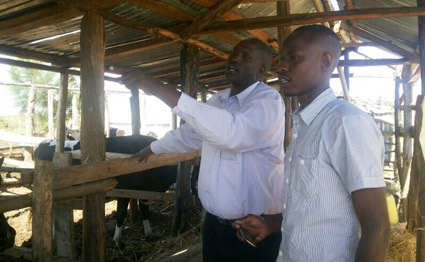After retiring, Kuseyo Sasai wasn’t sure what to do after serving the government for many years.
He explored various businesses before choosing to set up a greenhouse to grow tomatoes on a leased parcel of land in Narok County with Sh. 120,000 capital.
“The place was dry and rains were inadequate. Transporting water to the greenhouse was costly. I spent most of my income irrigating the land,” said Mr Sasai.
As income from tomatoes dwindled, he started planting garlic, vegetables and rearing dairy cows, naming the farm Saumu ranch. Saumu is a Kiswahili word for garlic.
The farm is divided into four parts. 20 acres are under garlic and courgette, and he rears dairy cows on another section. At the moment, he is considering putting up a camping site on one part which is adjacent to a river.
“The lower part of the ranch, which is largely undeveloped and scenic with a cliff, borders river Enkare Ng’osor. I plan to set up a camping site there,” Mr Sasai says. “I invested about Sh 2 million in dairy farming,” says the former director of the Kenya Dairy Goats Association.
Koinange family fighting to demolish Village Market, Tribe Hotel
He borrowed much of the money from banks and invested in a water project for irrigating his land and watering animals.
Hard work and determination bore fruit and Mr Sasai soon broke even. Eventually, dairy farming outperformed all other activities. By virtue of his background, he had an upperhand in running the livestock business. “I used to give farmers advice on how to keep dairy animals and even ventured into it on small-scale,” he said.
Four years since he launched his business, Mr Sasai now runs his outfit, Kuseyo Dairies in 74-acre ranch. It is a modern zero grazing unit with 11 Friesian cows which he bought at Sh100,000 each.
“I want to make a difference in the society. Maasai’s are poor yet they have vast land and thousands of cattle which bring them no value. I want to be an example of what we can do with our resources,” Mr Sasai said.
The farmer makes Sh300,000 per month from milk sales while garlic and courgettes fetch over Sh100,000.
Each litre of milk attracts Sh45.
“The first thing one needs to do before setting up a dairy farm is to plant fodder and have sufficient animal feed. This is the kind of information I want to give my community members,” he said.
“I discovered that I needed to transform my community and bring about change by demonstrating that there are options other than the traditional way of farming which brings low returns,” he said.
To run his enterprise, he has employed six permanent workers and hires casuals when need arises.
“I am disappointed that my community members have poor work ethics. That is why I have to bring in workers from other parts of the country. But my strategy is to put one local in each section of Saumu ranch for a given period. As they learn, I want to support them to replicate this venture in their homes’’ he said.
Nearby schools and shopping centres provide steady market for his produce. Sometimes, however, the market is flooded with milk and other farm produce, said Mr Sasai, seeing many producers lower prices.
However, he overcomes this obstacle by capitalising on the regular customers such as schools, he said. The farmer shares a word of advice to those considering to venture into farming — conduct market research.
Successful agri-business, he said, must start with a study of the target market: “Before I started growing garlic and courgettes, I studied the market and established that it needed the products and that the returns were good,” he said.
COW MATTRESSES
Mr Sasai says that dairy cows are like humans; the more comfortable they are, the more milk they produce, and the more profit one makes.
He urges farmers to invest in cow mattresses if they want to increase milk output. To become a successful dairy farmer, he says, one does not need to be a livestock expert, all one needs is passion, information and keenness to learn from the successful pioneers.









This is a very inspiring piece. I wish you shared the contacts of Mr Sasai for further information if one needed it